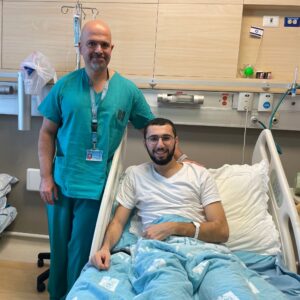
Roni, a Nahal Brigade soldier who was severely wounded by gunfire on Black Saturday, was evacuated by helicopter to Hadassah Ein Kerem Hospital with a tourniquet placed hours earlier on his leg. Hadassah’s doctors immediately jumped on the case and saved him in a series of complex surgeries.
“Roni fought the battle, and we at Hadassah fought for his life and succeeded,” summarizes Prof. Yoram Weil, Director of Hadassah’s Orthopedic Trauma Unit.

